The impact of RSV: a father’s story and call for prevention
When his own daughters became sick, one colleague saw firsthand the need to protect kids from RSV
December 14, 2023

Frederik Tack, a Merck employee and devoted father, has spent over a decade working in infectious diseases. So, when his daughters both contracted respiratory syncytial virus (RSV) infections, the impact of his work hit especially close to home.
RSV is a contagious, widespread seasonal infection that is similar to the flu. While people infected with RSV are usually contagious for about three to eight days, infants can continue to spread the virus even after they stop showing symptoms for up to one month.
“Being quite familiar with infectious diseases, I knew the basics of RSV and that almost all children contract it at least once before they’re 2 years old,” said Tack, executive director for our company in France.
"For most healthy children, RSV is like a cold, but for some it can become complicated. And unfortunately, my family witnessed these complications firsthand."
Frederik Tack
Executive director, FranceTack’s eldest daughter, Oriane, developed RSV and bronchiolitis at just 1 year old, leading to dehydration and a brief hospital stay for one night. A few years later, his second daughter, Anora, contracted the virus twice and experienced even more severe complications, including pneumonia that required a week-long stay in the hospital. Fortunately, Tack’s daughters both recovered following their hospital visits and have not experienced any long-term effects of the virus.

“As you can imagine, it was a pretty stressful time,” he said. “After experiencing it myself, my hope is that other parents won’t have to go through such an uncertain and frightening experience.”
The impact of RSV on infants and families
Grateful that his daughters are now healthy and fully recovered, Tack is acutely aware of the near- and long-term complications many other children may face with RSV. RSV can impact both children and adults but is particularly threatening for infants, who may not be able to fight the virus on their own. It can potentially lead to more serious respiratory conditions like asthma, bronchiolitis or pneumonia.
“In the first years that followed, we often held our breath, hoping those experiences with RSV wouldn’t repeat themselves or provoke long-term complications of other respiratory conditions,” Tack said.
A closer look at RSV
— RSV is contagious and can be spread through virus droplets when an infected person coughs or sneezes, or through direct contact with the virus, like kissing the face of a child with RSV.
— The virus can cause cold-like symptoms, including a runny nose, fever, coughing and wheezing.
— It’s one of the most common causes of infant hospitalizations in the U.S. and a leading cause globally.
Hospitalizations among children <5 years old each year in the U.S.
Deaths in children <5 years old each year in the U.S.
Estimated hospitalizations globally each year in children under 5 years old*
Estimated deaths caused by RSV globally each year in children under 5 years old*
An estimated >95% of RSV infections and >97% of RSV-related deaths globally occur in resource-limited countries*
*Data based on 2019 estimates.
There’s a widespread need for protection for both healthy and high-risk infants from RSV globally, including in resource-limited countries where RSV represents a substantial burden of disease. And during RSV season, the impact can be even greater. RSV can put a significant strain on the health care system, but most importantly, it impacts families who want to help protect their children and keep them healthy.
Tack said he takes great pride in being part of a company with over 130 years of innovative work dedicated to reducing the devastating toll of certain infectious diseases around the world.
“Nobody wants to see their children suffering with little that you can do to help them,” said Tack.
“I’m inspired by the ongoing commitment and dedication within the public health space to help address these diseases through scientific innovations.”
— Frederik Tack


